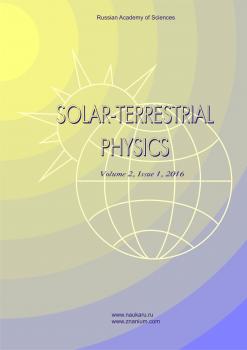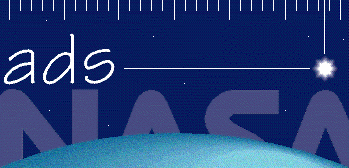Irkutsk State University
Irkutsk, Russian Federation
Irkutsk, Russian Federation
Irkutsk, Russian Federation
We analyzed the structure of coronal features, using data on the March 20, 2015 total solar eclipse. The Ludendorff index characterizing the flattening of the corona is 0.09. The solar corona structure in the Northern and Southern hemispheres corresponds to the maximum and post-maximum phases of solar activity, respectively. The asynchronous development of magnetic activity in the Sun’s Northern and Southern hemispheres caused a substantial asymmetry of coronal features observed at the reversal of polar magnetic fields in the current cycle. The polar ray structures in the Southern Hemisphere are associated with the polar coronal hole, while in the Northern Hemisphere a polar hole has not been formed yet. We examine the relation between large-scale magnetic fields and location of high coronal structures.
Total solar eclipse, asymmetry, solar corona
1. Druckmüller M. A noise adaptive fuzzy equalization method for processing solar extreme ultraviolet images. Astrophys. J. Suppl. 2013, vol. 207, article id. 25, 5 p. DOI:https://doi.org/10.1088/0067-0049/207/2/25.
2. Eselevich V.G., Fainshtein V.G., Rudenko G.V. Study of the structure of streamer belts and chains in the solar corona. Solar Phys. 1999, vol. 188, pp. 277-297.
3. Gulyaev R.A. Outer solar corona as an optical manifestation of heliospheric current sheet. Uspekhi Fizicheskikh Nauk [Physics-Uspekhi [Adv. in Phys. Sci.]. 1992, vol. 162, iss. 12, pp. 155-159. (In Russian).
4. Gulyaev R.A. Solar cycle variation on the solar corona shape: A new outlook. Astron. Astrophys. Trans. 1997, vol. 13, no. 2, pp. 137-144.
5. Hansky. Die totale Sonnenfinsterniss am 8 August 1896. Bull. Acad. Imper. Sci. St._Petersbourg, 1897, vol. 6, pp. 251-270.
6. Judge P.G., Burkepile J., de Toma G., Druckmüller M. Historical eclipses and the recent solar minimum corona. ASP Conf. Ser. 2010, vol. 428, pp. 171-176.
7. Klepikov D.V., Filippov B.P. Behavior of the polar field magnetic focuses in solar cycle from SOHO/EIT. Izvestiya RAN [Bull. Russian Academy of Sciences: Physics]. 2006, vol. 70, pp. 1436-1438. (In Russian).
8. Koomen M.J., Howard R.A., Michels D.J. The shape of the outer corona during cycle 21. Solar Phys. 1998, vol. 180, iss. 1/2, pp. 247-263. DOI:https://doi.org/10.1023/A:1005039609265.
9. Kuchmi S.L., Merzlyakov V.L., Molodensky M.M. On 3D-structure of the solar corona. Astronomicheskii Zhurnal [Astron. J.]. 2001, vol. 78, no. 10, pp. 953-960. (In Russian).
10. Makarov V.I., Tlatov A.G., Fatianov M.P. Three-dimensional modeling of the corona in different phases of solar magnetic cycle. Period: 1870-1991. Izvestiya Vysshikh Uchebnykh Zavedenii. Radioelektronika [Radioelectronics and Communications Systems]. 1996, vol. 39, no. 10, pp. 1268-1274. (In Russian).
11. Mordvinov A.V., Yazev S.A. Complexes of activity decay and formation of coronal holes on the Sun. Astronomicheskii Zhurnal [Astron. J.]. 2013, vol. 90, no. 6, pp. 491-500. (In Russian).
12. Mordvinov A.V., Yazev S.A., Rykova E.G., Dvorkina-Samarskaya A.A. Long-term changes in geometry of the Sun’s polar magnetic field from observation of total solar eclipses. Solnechno-Zemnaya Fizika [Solar-Terrestrial Physics]. 2011, iss. 18, pp. 69. (In Russian).
13. Mordvinov A.V., Yazev S.A. Reversals of the Sun´s polar magnetic fields in relation to activity complexes and coronal holes. Solar Phys. 2014, vol. 289, pp. 1971-1981.
14. Mordvinov A.V., Grigoryev V.M., Erofeev D.V. Evolution of sunspot activity and inversion of the Sun’s polar magnetic field in the current cycle. Adv. Space Res. 2015, vol. 55, iss. 11, pp. 2739-2743. DOI:https://doi.org/10.1016/j.asr.2015.02.013.
15. Perel Yu.G. Famous Russian Astronomers. Moscow, State publishing house of technical-theoretical literature, 1951, pp. 194-211. (In Russian).
16. Peshcherov V.S., Yazev S.A., Ozhogina O.A., et al. Solar corona observations during March 29, 2006 solar eclipse. Selected Problems in Astronomy: Materials of theoretical and practical conference “Sky and Earth” (Irkutsk, November 21-23, 2006). Irkutsk: Irkutsk State University Publ., 2006, pp. 151-156. (In Russian).
17. Pishkalo M. Flattering Index of the solar corona and the solar cycle. Solar Phys. 2011, vol. 270, iss. 1, pp. 347-363. DOI:https://doi.org/10.1007/s11207-011-9749-y.
18. Tlatov A.G. The centenary variations in the solar corona shape in accordance with the observations during the minimal activity epoch. Astron. Astrophys. 2010, vol. 522, id. A27, 5 pp. DOI:https://doi.org/10.1051/0004-6361/201014082.
19. Vsekhsvyatsky S.K., Nikolsky G.M., Ivanchuk V.I., Nesmyanovich A.T., Ponomarev E.A., Rubo G.A., Cherednichenko V.I. Solnechnaya Korona i Korpuskulyarnoe Izluchenie v Mezhplanetnom Prostranstve [Solar Corona and Corpuscular Radiation in the Interplanetary Space]. Kiev, Kiev University Publ., 1965. 216 с. (In Russian).
20. Vorontsov-Vel’yaminov B.A. Ocherki Istorii Astronomii v Rossii [Essays in the History of Astronomy in Russia]. Moscow: State publishing house of technical-theoretical literature, 1956, pp. 327-329. (In Russian).
21. Wang, Y.-M., Sheeley, N.R.J., Rich, N.B. Coronal pseudo-streamers. Astrophys. J. 2007, vol. 658, iss. 2, pp. 1340-1348. DOI:https://doi.org/10.1086/511416/
22. Yazev S.A. Catalogue of complexes of activity on the Sun at the growth phase of Schwabe-Wolf 24 cycle. Izvestiya Irkutskogo Gosudarstvennogo Universiteta. Seria “Nauki o Zemle” [Bulletin of Irkutsk State University. Earth Sciences Ser.]. 2012, vol. 5, no. 2, pp. 295-303. (In Russian).
23. Yazev S.A. Complexes of activity on the Sun in 24 cycle of solar activity. Astronomicheskii Zhurnal [Astron. J.]. 2015, vol. 92, no. 3, pp. 260-269. (In Russian).

















